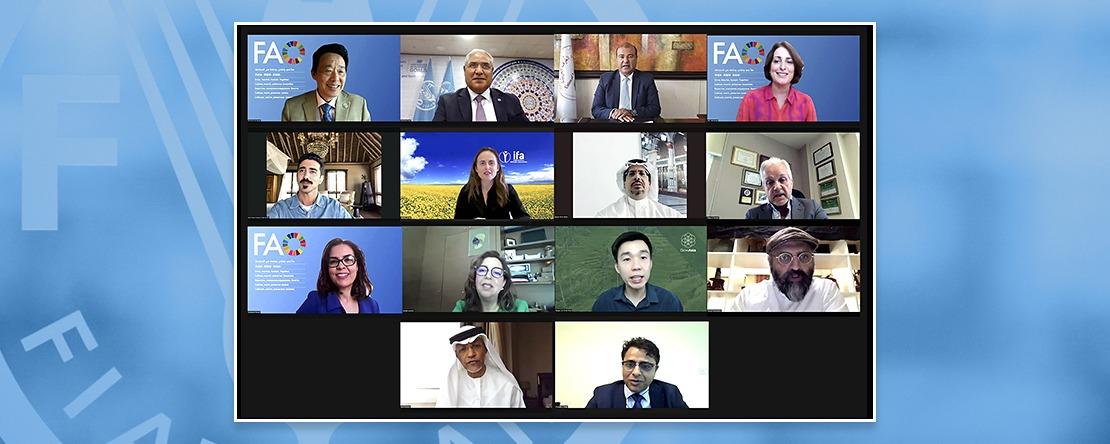A dialogue with the private sector to transform agri-food systems in the Near East and North Africa

12 July 2021, Cairo - The Food and Agriculture Organization of the United Nations (FAO) initiated a dialogue with the private sector in the NENA region to identify opportunities for private sector engagement and action around the Sustainable Development Goals (SDGs) and SDG #2 in particular, virtually today.
FAO Director-General Qu Dongyu opened the dialogue, highlighting that “political commitment remains essential, establishing major alliances and engagement with key stakeholders are key to help build consensus towards the SDGs.”
Introducing the event, FAO Assistant Director-General and the Regional Representative for the Near East and North Africa, Abdulhakim Elwaer, emphasized that “a broad array of private sector actors, from farmers, including smallholders and family farmers to micro, small and medium-sized enterprises (MSMEs) and large companies as well as financial institutions will be instrumental to drive our efforts.”
A statement followed by Khaled El Hanafy, the Secretary-General of the Union of Arab Chambers of Commerce, in which he stressed “the need to promote technology use by empowering smallholders and agri-food accelerators that can drive the efforts forward.”
A pursuit through business practices
The need for synergy and a shared cause between stakeholders is probably nowhere more evident for the Near East and North Africa (NENA) region than in the agri-food systems, where the private sector plays such an essential role along the whole food chain. Today, the region’s food and agriculture sectors are poised to meet some of the world’s biggest challenges in our common pursuit of SDG 2; from providing a growing population with affordable, accessible, and nutritious food to reducing hunger and malnutrition, combating growing obesity, dealing with the already stark impacts of climate change, addressing water scarcity and other environmental concerns, and tackling emerging threats from pests and diseases.
“Together, we can deal with the challenges of the region, empower the most vulnerable communities, including smallholder producers, the youth, and women, through inclusive pro-poor interventions in rural areas,” Qu Dongyu added.
The dialogue aimed at developing a conversation with three main categories of private sector operators:
- Micro-, small and medium-sized agri-food enterprises (MSMEs), including start-ups, who can play a critical role in achieving food security and eradicating rural poverty, with special emphasis on digital agriculture and youth-and women-led businesses;
- Large firms, including large national and multinational companies and State-owned enterprises operating in the agri-food sector, including production, processing, distribution, and retail;
- Financial institutions, including commercial banks and private investors, impact investors and other private investment institutions who have the potential to play a critical role in mobilizing private investment to achieve the SDGs.
The dialogue was divided into two-panel discussions. The first was on “How can public-private engagements provide large-scale solutions for addressing regional priorities and achieving the SDGs in the Near East and North Africa Region”, moderated by Beth Bechdol, Deputy Director-General FAO. The panel was consisted of:
- Sheikh Majid Sultan Al Qassimi - Partner, Soma Mater
- Alzbeta Klein - CEO/Director-General, International Fertilizer Association (IFA)
- Ayman Amin Sejiny - CEO/General Manager-Islamic Corporation for the development of the Private Sector - Islamic Development Bank (IsDB)
- Moez El-Shohdi - President of the Food Banking Regional Network
The second session was on “Green and inclusive technologies and investments in Agriculture – what is the potential” moderated by Ismahane El Ouafi, Chief Scientist, FAO, and had:
- Soud Ba'alawy - Executive Chairman Enspire (DIFC) Ltd.
- Ouiam Lahlou - Professor at “Institut Agronomique et Vétérinaire Hassan II” at Rabat, Morocco
- Yousef Hamidaddin - CEO, Agri-Tech Accelerator
- Reginald Lee - Director, Programs, Grow Asia
- Chandra Singh - Director Business Development, Elite Agro
Both sessions allowed Q&As and interventions during both of the panels with the panelists and the FAO leadership.
Hand in Hand for a better life
Transforming the world’s agri-food systems, the way we produce, process, distribute and consume food has been identified as one of the key avenues to achieving many targets of the 2030 Agenda. This means better production, better nutrition, and a better environment for a better life.
The evidence-based and country-led Hand in Hand Initiative launched by FAO can provide a tangible framework that would allow us to demonstrate the impact of working together.
This initiative focuses on the poorest rural communities left behind and have not had the opportunity to contribute to their country’s development.
Through match-making partnerships, including donor countries, development banks, the private sector, and others, FAO wants to lift these communities out of poverty. And by facilitating their access to investments, markets, and more effective production tools, the goal is to render them active actors in developing their countries and territories.
Contact
RESOURCES FOR THE MEDIA:
Photos: FAOnews Flickr account
Twitter: @FAOinNENA_EN and @FAOinNENA
MEDIA CONTACT
Mohamed Alaidaroos
(+971) 50 699 6411
Mohamed Moussa (Cairo)
[email protected]
(+2) 0100 1400 724
